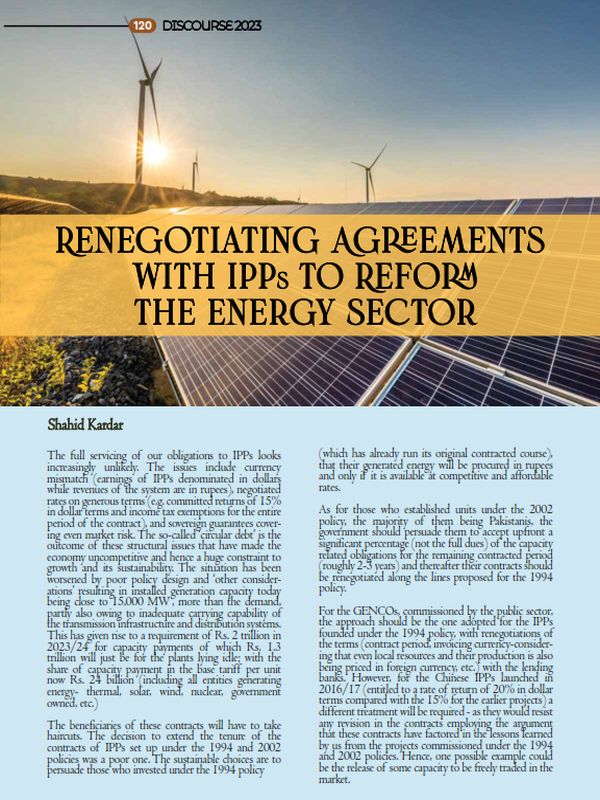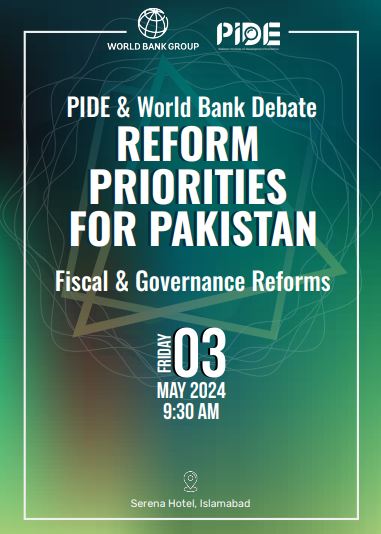Renegotiating Agreements with IPPs to Reform the Energy Sector
The full servicing of our obligations to IPPs looks increasingly unlikely. The issues include currency mismatch (earnings of IPPs denominated in dollars while revenues of the system are in rupees), negotiated rates on generous terms (e.g. committed returns of 15% in dollar terms and income tax exemptions for the entire period of the contract), and sovereign guarantees covering even market risk. The so-called ‘circular debt’ is the outcome of these structural issues that have made the economy uncompetitive and hence a huge constraint to growth and its sustainability. The situation has been worsened by poor policy design and ‘other considerations’ resulting in installed generation capacity today being close to 15,000 MW, more than the demand, partly also owing to inadequate carrying capability of the transmission infrastructure and distribution systems. This has given rise to a requirement of Rs. 2 trillion in 2023/24 for capacity payments of which Rs. 1.3 trillion will just be for the plants lying idle; with the share of capacity payment in the base tariff per unit now Rs. 24 billion (including all entities generating energy- thermal, solar, wind, nuclear, government owned, etc.)
The beneficiaries of these contracts will have to take haircuts. The decision to extend the tenure of the contracts of IPPs set up under the 1994 and 2002 policies was a poor one. The sustainable choices are to persuade those who invested under the 1994 policy (which has already run its original contracted course), that their generated energy will be procured in rupees and only if it is available at competitive and affordable rates.
As for those who established units under the 2002 policy, the majority of them being Pakistanis, the government should persuade them to accept upfront a significant percentage (not the full dues) of the capacity related obligations for the remaining contracted period (roughly 2-3 years) and thereafter their contracts should be renegotiated along the lines proposed for the 1994 policy.
For the GENCOs, commissioned by the public sector, the approach should be the one adopted for the IPPs founded under the 1994 policy, with renegotiations of the terms (contract period, invoicing currency-considering that even local resources and their production is also being priced in foreign currency, etc.) with the lending banks. However, for the Chinese IPPs launched in 2016/17 (entitled to a rate of return of 20% in dollar terms compared with the 15% for the earlier projects) a different treatment will be required – as they would resist any revision in the contracts employing the argument that these contracts have factored in the lessons learned by us from the projects commissioned under the 1994 and 2002 policies. Hence, one possible example could be the release of some capacity to be freely traded in the market.
There is another option, which could also be adopted for the IPPs established under the 2022 policy. As the less expensive hydro power and renewable energy projects come onstream we could exercise the ‘pay’ option of the ‘take or pay policy’ and literally stop purchasing electricity from the thermal power generators.
And these efforts need to be complemented by adequate and timely investments to attend to the technical inadequacies and inefficiencies and governance issues of the transmission and distribution systems. As an illustration of this point, there are several reforms that are required on the service delivery side, including:
- Simplification of the tariff structure (presently littered with several bands for each consumer category, and encumbered by a host of cross-subsidies), including an examination of the lowering rate of tariffs to increase the consumption of electricity, thereby contributing to the capacity payment obligations.
- Withdrawal of the free/concessional provision of electricity to civil/military/judicial and other services and the WAPDA, NTDC and DISCO employees; roughly 190,000 serving and retired personnel of electricity agencies are provided 400 million units free per annum valuing more than Rs. 25 billion, whereas free units to employees of other institutions are essentially provided as a perk with the relevant organisation picking up the cost built into its budgetary allocations.
- Forcing the public sector defaulters (the provincial and federal government organisations) to pay up
- Outsourcing the management of DISCOs and the installation of smart meters (the pre-paid variety), etc., to address the 17.5% technical and distribution losses (of roughly Rs. 300 billion in 2023) over and above the NEPRA determined limit, corruption and consumer theft of electricity through collusion with official staff and weak effort on recovery of dues, estimated to be close to Rs. 590 billion in 2023.
- Right sizing and rationalisation of the bloated and poorly skilled politically appointed work force of the organisations in the sector (especially in the DISCOs).
The author is a former Governor of the State Bank of Pakistan and former Minister for Finance and Planning in the Government of Punjab.





